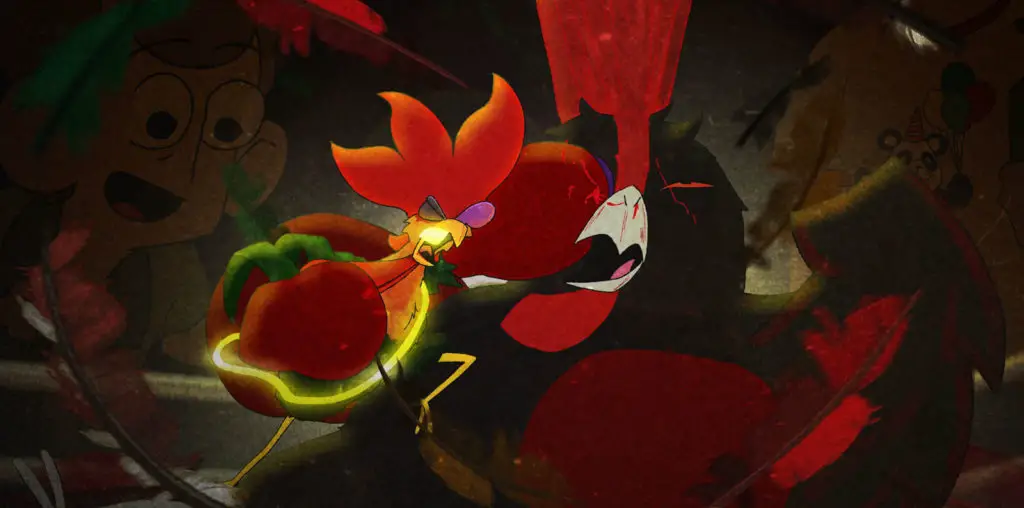
You’ve adapted Lovecraft, Poe, Bradbury, now Charlie Higson, any other writers you plan on adapting?
I just got the rights to a Jack Ketchum book, called Ladies Night. I don’t know if you’re familiar with him, but I think he’s like the next Stephen King. His stuff is really disturbing. And I’m also working with David Mamet on a project, which is an adaptation of his play “Edmund.” William H. Macy is attached to star with Julia Stiles. It’s a very dark piece though, it’s as equally dark as King of the Ants. So it may be a little difficult to get that money right away.
Can you give me a bit of the storyline?
It’s about a guy who has a midlife crisis, leaves his wife, goes on this quest to get laid. One thing leads to another, and he goes on this downward spiral, where he ends up with a young waitress who he accidentally murders. It gets worse from that point on. It’s a dark piece.
Do you think it’s easier to adapt stories or do new ones?
Well, they both have their own problems. If you dream up something specifically for a movie, sometimes it’s easier because you’re thinking in movie terms. With an adaptation your taking something that was created for another media and trying to twist it and turn it to make the movie. With King of the Ants we were really lucky that Charlie Higson has done a lot of screenplays and writing for television. In the UK he’s very well known as a comedian. He does a show called “The Fast Show,” it’s kind of like Monty Python. And then he writes these very disturbing novels in his own time. He was willing to do the kind of work that needs to be done when you take a book and turn it into a movie. Which is you’ve got to throw things out, you have to spare it down, change things around. Some writers are like, “My book is sacrosanct, I can’t touch it.” One of the lines they teach you in screenwriting is that you have to kill your darlings. You always have to make some ruthless and drastic changes.
Can you talk about how King of the Ants came to be?
Well, it’s really because of George Wendt, who is an old friend of mine. He had read the book and brought it to me, saying that if you like it, I’ll option it. I couldn’t put it down, it’s a page turner. It completely knocked me out. It breaks all the rules. The main character commits the murder of an innocent guy, about a third of the way into the story. As I was reading it, I couldn’t believe that the protagonist was actually going to go through with it. I kept thinking something would happen, that he was going to have a crisis of conscience or something, but he doesn’t. From that point on, anything is possible. I love those kinds of stories where they’re not playing by the rules. We were able to get Charlie to adapt it himself. Then we took the screenplay around, and every where we took it they’d say “Fantastic writing…Gripping…Couldn’t put it down. But we could never do this. It’s too much. It’s too dark. It’s too violent. The guy gets away with the crime. It’s immoral.” So it took us seven years to get the movie made. Until we found The Asylum, which is the name of the company that ended up producing it, they really understood it and appreciated it for what it was.
How much did the story change from the book?
(Slight movie spoilers.) There were considerable changes, the biggest being that Sean doesn’t get back with Susan, the wife of the man he murdered. It’s funny cause Charlie said he was thinking about doing that in the sequel. That the sequel would be about Sean and Susan. When he told me that, I thought what a great thing, we should really incorporate that into the story. That was the biggest departure.
The movie is really brutal. Did you have to tone down the violence from the book at all?
It’s all there. His stuff is really disturbing; it’s really kind of primitive violence, real Neanderthal level. There’s a lot of bludgeoning going on in this movie. The idea of it is how hard it is to kill somebody. This is his first murder, he does it pretty badly, he botches the murder. It really just goes on and on. The idea behind the book, in a weird way, is that it’s a positive story; it’s about a kid finding out what he does well. His calling.
The hallucination scenes are very much your style; are those in the book?
They are. The hallucinations are in the book. That I also really liked. It’s so subjective; you’re going into the head of this guy. He’s dreaming in a way. It’s funny, when we first started screening the picture there was a lot of debate whether we should keep those hallucinations in or not, because they almost seem like another movie in a way. I finally decided that they were important and that we really needed to get a sense of… I was talking to Charlie Higson today and he was saying they really symbolize his guilt. That’s what those are all about. That we have to go through that with him to get where he is emotionally and after he goes through all that, in a sense, he’s exorcized of his guilt. He no longer feels responsible for the murder. Which is more chilling.
Get the rest of the interview in part three of STUART GORDON: KING OF THE GOREHOUNDS>>>

